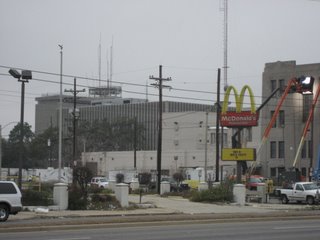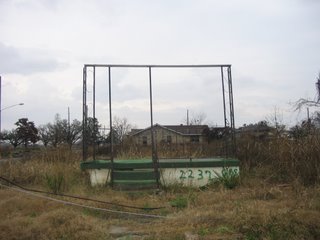Thursday, December 28, 2006
Saturday, December 23, 2006
A little video from the 9th Ward....
It's now past 3:30 a.m. and I'm headed to bed. but before crashing I had the chance to rough out a small bit of video I shot while we were in the hard-hit 9th Ward.
http://s24.photobucket.com/albums/c23/
jderrick/?action=view¤t=9thWard.flv
We did some good things and completed some files, but the duty of rebuilding New Orleans is larger than I can understand.
Some of us are already planning how to get back down there....
Thursday, December 21, 2006
Not So Easy in the Big Easy
A few memorable observations from our week in New Orleans:
-The District Attorney’s office has one copy machine, and it was broken all of last week.
-The Sheriff’s office is still run on a generator. When the generator was down on Tuesday morning, they had no power, no phones, and no internet, and the databases run by the sheriff were inaccessible.
-Louisiana law allows a person to be held for 60 days until the DA decides whether or not to press charges.
-Temporary prisons have just been built next to Orleans Parish Prison. They look like a colony of giant bubble shaped tents surrounded by barbed wire.
-It is difficult to interview a client through Plexiglas using telephones, especially when the client is incompetent. (And it is a long, difficult process to get that client into an interview in the first place.) -The McDonald’s across from the public defender’s office now only consists of a sign, a set of concrete picnic tables, and an empty lot. The sign still advertises McGriddles from before Katrina.
-The McDonald’s across from the public defender’s office now only consists of a sign, a set of concrete picnic tables, and an empty lot. The sign still advertises McGriddles from before Katrina.
-Many streets are completely abandoned, with no sign of any residents returning. Some homes look as if they have not been entered since the hurricane.
-Food is amazing in New Orleans.
The lower 9th ward....
This afternoon one of the lawyers from The Pro Bono Project of New Orleans drove with us outside the islands of urban normalcy we've become accustomed to in the business district and the French Quarter. We saw some of the hardest hit areas and they hit pretty hard.
Personally, I'm from Eastern North Carolina and I've seen my share of hurricanes. And I was on the Gulf Coast immediately following Katrina. I've seen a little meteorological nastiness.
But this looked like a bomb had gone off.
There are blocks of houses that just aren't there anymore, front porch steps leading to nothingness, and this afternoon there were UNC law students walking through it and we were pretty quiet.
I've shot some pictures and some short videos on my camera. I'll be posting them as soon as I get back home.
Wednesday, December 20, 2006
So this is how it feels...
It's probably obvious to all that this is easier said than done. Today, Allison and I interviewed an OPP inmate who was declared competent in April, then incompetent in July and again in September. He was remanded to Feliciana, but because of the lack of beds, he is still being held in OPP. At first he was absolutely silent, nearly catatonic, in response to our questions, but later began to speak. He told us that today was March 27 and that all he had to do was wait eight and a half months until September 16, when he would be getting out, so he had nothing to say to us. We tried to explain that we were there to help his lawyer get him out, but to no avail. When he saw us taking notes, he decided that we were reporters with the Washington Post, and refused to speak to us further. We couldn't even get him to give us his birthdate, let alone tell us about his medical treatment, what medications he should be taking, and so on. After 10 minutes of trying to coax him to tell us more, we gave up and left, feeling bereft and powerless. Clearly the man is in need of significant medical treatment that he is not receiving, which is pretty much all we can tell his lawyer. So, more likely than not, he will continue to sit in jail for many more months, perhaps more than the presumptive maximum sentence for the crime with which he has been charged, but not tried or convicted. And there's very little that anyone can do about it. At least for now.
None of us need belabor the fact that the criminal justice system here, especially after the storm, is in desperate need of reform. In fact, before we started our work here, we were asked to sign a contract stating that we would not make any public statements about the quality of the system or the work of any of the partners in the Katrina Gideon Interview Project. But there's really nothing I can say about the system that hasn't already been said. What I can say, however, is that I am utterly exhausted from only three days of trying to manuever in the system, trying to stay on the sheriff's good side so that we can keep going in and out of the jail, trying to figure out when and if inmates will be available for interviews, trying to hear them through the thick plexiglass that separates them from us in the interview rooms, trying to squeeze in a midday meal in the midst of the chaos, walking the several blocks from the public defender's office to the jail and back in the rain, and generally ending each day feeling completely ineffective.
If what I am feeling is even one one-thousandth of what these attorneys go through every day here in New Orleans, I can't imagine how they manage to pull themselves out of bed in the morning. I have the deepest respect and admiration for their courage and their determination in the face of tremendous obstacles. If I turn out to be even one one-thousandth of the lawyer that most of them are, I'll consider myself pretty good.
The group working on divorces....
We have a group of folks doing criminal work. This is the side of the legal field that deals with folks who may or may not have broken some official law. Our students have been spending time at a local prison -- interviewing inmates and working to aid them.
We've also got a group doing civil work -- not the cops and robbers side of the law -- but wills, contracts, administrative stuff.... One part of this group is working on successions -- property getting passed from one person to another by way of lots of paperwork.
Another part of the civil group is working on divorces. This is the group of four students I'm working with.
The idea of helping folks get divorced raised my eyebrow. Folks and families getting split up isn't a warm and fuzzy thing, but these are uncontested, pretty amicable splits and our work helps folks get on with their lives.
Some of these cases may be linked to Katrina, but a lot of them are cases that have simply been in the backlog since the storm hit and so many things have been put on the back burner.
These cases involve an amount of paperwork -- things need to be signed, filed, mailed, drafted... and done correctly in the right order. The lawyers we're working with give us some files, we figure out what's the next step in the process, and we take care of it: so and so needs to be mailed a waiver of service, the next thing needs to be filed at a courthouse, somebody needs to be informed that their divorce has gone through....
And that's my little corner in a nutshell....
Day three....
I'll be taking pictures and will keep folks posted....
Monday, December 18, 2006
A City Still in Need
As a member of our criminal group, I’ll be spending the week interviewing inmates in Orleans Parish Prison. We got our first glimpse into the state of the New Orleans legal system today when we met at the Office of the Public Defender for training. During training, we heard stories of inmates lost in the system, flooded evidence rooms, and a huge backlog of cases.
Many of the inmates that we will be interviewing have been held in prison without convictions longer than their sentence would last even if convicted. Our job is to conduct an interview with the inmate and compose a memo for the public defender assigned to the case. This way, the public defender will have a good head start when he or she gets the case.
Katrina may have hit over a year ago, but its impact still overwhelms the city. From the flood line marking the abandoned houses to the box of “Unidentified Floating Evidence” from the basement of the courthouse, the struggle for normalcy is far from over.





